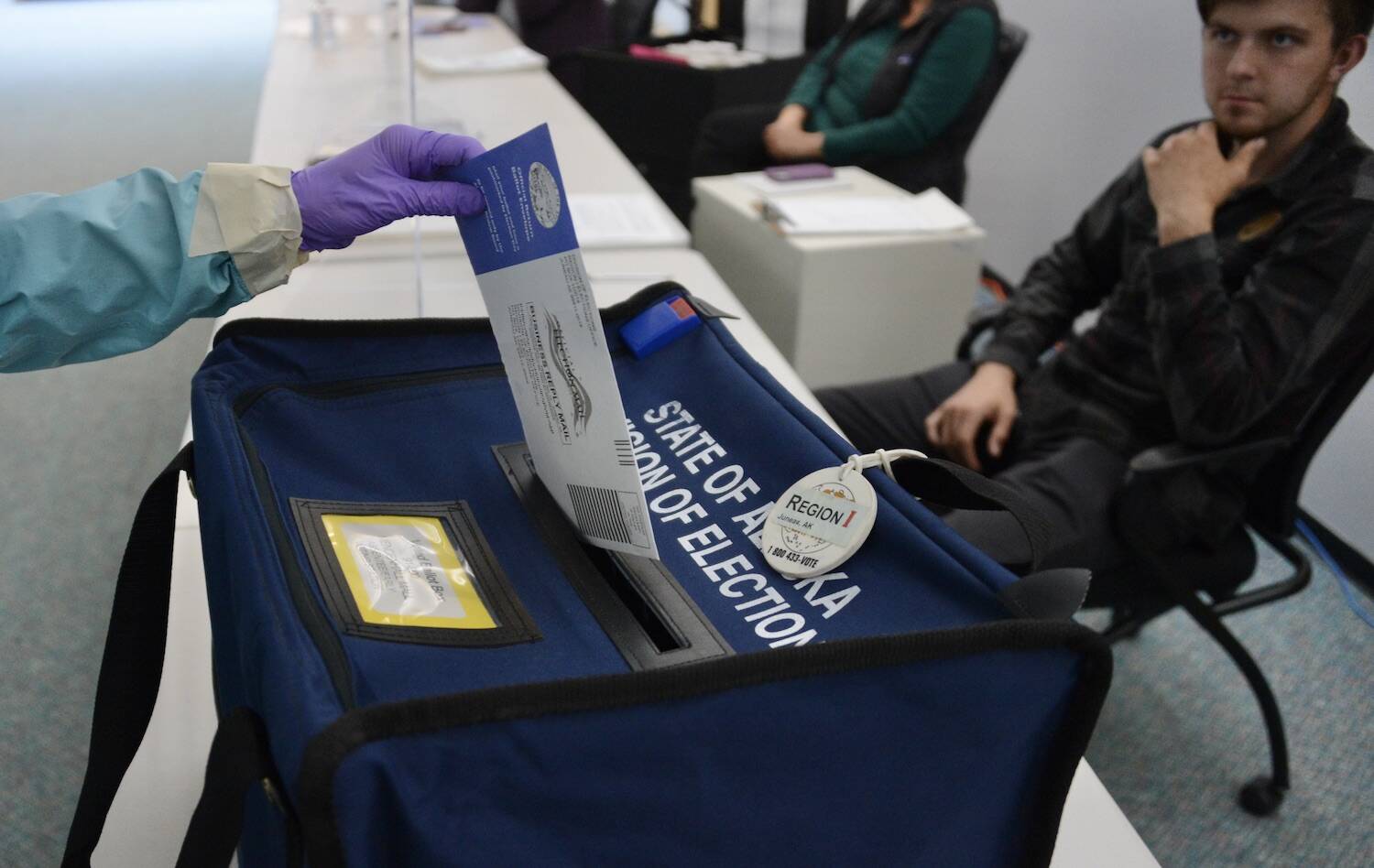The Alaska Legislature will take up election reform proposals this session, with Gov. Mike Dunleavy introducing a bill through the House, and the Senate majority caucus planning to introduce its own reforms later this week.
The legislation is in response to a range of issues and complaints around Alaska’s elections last year, including concerns around delays in ballot counting and transparency, election security, and problems with staffing, absentee ballots, and long lines at some polling places.
Dunleavy introduced a bill through the House on Wednesday, House Bill 63, proposing new rules for, among others, voter registration, voting by mail, voting and counting timelines.
“This bill is a necessary step to ensure the integrity and transparency of our election process while addressing Alaskans’ concerns about reliability,” Dunleavy said in a prepared statement on Wednesday. “By modernizing our election code, we can provide a more efficient and trustworthy system for voters and election officials alike.”
The bill also would put new limits on voting time.
All ballots would have to be received by the state Division of Elections by Election Day, under the new legislation, when currently they just have to be postmarked and mailed by that day. It would shorten early voting time, which opens 15 days prior to and ends on Election Day. Under the bill, it would close five days before Election Day.
The bill would eliminate the automatic voter registration process when applying for the Permanent Fund Dividend. That provision was enacted in 2016, when Alaskans passed a ballot measure to allow voter registration during the application process.
For vote by mail, it would provide postage for all absentee ballots being mailed in. It would allow ballot counting by the Division of Elections to begin sooner, up to 10 days before the election. It would also create an option for communities with less than 750 people to opt for all by-mail voting for their elections.
The bill was introduced in the House on Wednesday, and referred to the state affairs and finance committees.
On the Senate side, the new majority, made up of a coalition of Democratic and Republican senators, is set to put forth an election reform bill focused on a range of issues, including streamlining the voting process and expanding access for voters.
The bill is scheduled to be introduced in the Senate on Friday, but Anchorage Democratic Sen. Bill Wielechowski discussed the upcoming bill on Wednesday.
“First off, it addresses the fact that you have 106% more registered voters in the state of Alaska than you do citizens,” Wielechowski said. “There’s unusual reasons for that, but we’re really making an effort to try to clean up the voter rolls, because that’s been a big concern for many people.”
For mail-in ballots, the bill would also pay for postage for all ballots, and eliminate the witness signature requirement for absentee ballots, which Wielechowski said isn’t verified and has disqualified ballots unnecessarily.
“So I think a lot of Alaskans are surprised and kind of shocked that there’s this bureaucratic kind of roadblock,” he said. “And that ends up disqualifying hundreds, if not thousands of Alaskans for something that they don’t even check.”
The bill would establish a ballot tracking barcodes for absentee ballots, and a system for review. If there’s a mistake on a ballot, the bill would create an easier process for corrections, he said. “We’re trying to allow for ballot curing, which is, if you make a mistake on a ballot, the Division of Elections can notify you, and you can fix it.”
“We heard stories this past year about somebody who made a mistake on their ballot. It was identified on their absentee ballot. It was identified before the election, and they couldn’t fix it. Everybody knew there was a mistake and unfortunately, his ballot was just discounted. Yeah, so we’re trying to fix things like that.”
To address long lines at polling places, as seen in hours-long lines to vote in Anchorage last year, the bill would require ballot drop boxes be available at each regional office, if feasible, and one per every 20,000 residents.
Wielechowski said the Senate majority would not support some provisions in Dunleavy’s bill, such as eliminating the voter registration process in the PFD application. But he said they would work with the governor on election reform initiatives, as the bills move through the legislative process.
“There were some things that were similar to what we have,” he said. “And our bill is a little bit more expansive, I’d say. But look forward to working with the governor, with the (Senate) minority, and the House, and trying to come up with a solution.”
Election reform is one of the top four priorities laid out by the Senate majority caucus this year, along with education funding, energy and pension reform.
• Corinne Smith started reporting in Alaska in 2020, serving as a radio reporter for several local stations across the state including in Petersburg, Haines, Homer and Dillingham. She spent two summers covering the Bristol Bay fishing season. Originally from Oakland, California, she got her start as a reporter, then morning show producer, at KPFA Radio in Berkeley. Beacon reporter James Brooks contributed to this article.This article originally appeared online at alaskabeacon.com. Alaska Beacon, an affiliate of States Newsroom, is an independent, nonpartisan news organization focused on connecting Alaskans to their state government.

